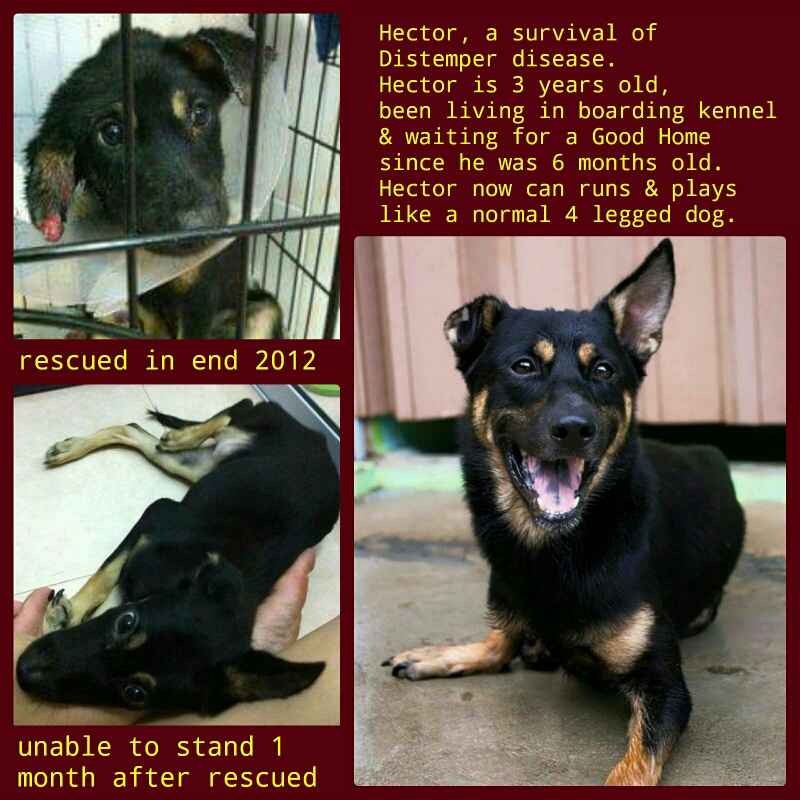F7-Friends of Seven is a group of three women friends—Ai Leng, Poey Yee Lau and Ms. Ong, who do volunteer work in caring for stray dogs in Singapore. F7 refers to: Huahua, Jordan, Candy, Leila, Honey, Hector and Qmo, these were the first seven dogs they started caring for in 2010. Ai Leng is a Math tutor, Poey is an architect assistant drafter and Ms. Ong is a nursery teacher. Before F7, there three women were doing volunteer work in the Animal Welfare Rescue Centre of Singapore starting 2008. In 2009, through their personal capacity and the assistance of Action for Singapore Dogs, they started stray feeding and sterilization—mostly these were animals that were left on abandoned industrial and public areas in Singapore.
According to Ai Leng, they started F7 with the objective of helping the homeless dogs to find homes. What they do is have the dogs professionally cured from whatever illness they may be suffering that was brought by their living on stray. They have encountered cases where the dog had cancerous disease; there was one instance where a pregnant dog was poisoned; and another has a case of distemper. After treatment they bring the dogs in commercial boarding kennels. While the dog awaits a suitable foster home, F7 visits the kennel dogs on a weekly basis, rehabilitate the animal by ensuring that they get some human touch and walked on leashes. And since they cannot afford to have all strays boarded on commercial kennels, F7 continuously and regularly go around distributing food supplies to strays they marked on streets.
Besides actual caring for these dogs, F7 finding suitable home for the strays is one of their main activity. Before adoption, they do thorough screening of interested parties, assessing their capability and commitment to care for animals. They also do regular visit to foster homes who have taken dogs that used to be under their care.
Since they are a small group and they do this purely voluntarily, they are usually faced with persistent challenges over the years. First, there is the issue of finance. Since they are not a registered organization, F7 does not receive any outside funding, the cost of boarding in commercial kennels is on an average SGD 400 per dog every month. Medical and healthcare also costs a lot. Sometimes they do receive assistance from friends and family. Others are skeptical about what they do and some view the strays as nuisance. Hence, most of the time the burden of financing their activities remain in their personal capacity. Second, there is manpower or time constraint. There are only three of them, besides attending to their regular schedule of visiting their rescue, fund raising, doing follow-up visits to rehomed dogs, attending events relevant to their advocacy, they also have to attend to their regular jobs. Third, government policies are also a burden to them, particularly that of Agri-Food & Veterinary Authority of Singapore (AVA) and Housing Development Board (HDB) regulations. As for AVA they still practice culling of animals to control the population. When the dog is captured by AVA they will be put down, even those that have been sterilized, unless it was bailed out; and bailing an animal costs money. As for HDB regulations, not all dogs can be adopted. There is a size requirement, the dog has to be obedience trained and that it has to be adopted through three approved agencies, namely Action for Singapore Dogs (ASD), Society for The Prevention of Cruelty to Animals (SPCA), and Save Our Street Dogs (SOSD). Therefore, not all rescued dogs are eligible for adoption. And finally, perhaps the most importantly is the public mindset. Besides the challenge to convince people to give financial assistance for efforts to save strays, F7 is also challenged with the way a lot of people prefer buying dogs from shops. Mixed-breeds (mongrels) are stereotyped as unsuitable house pets, leaving them homeless.
When asked about why they do all these despite all the difficulty, Ai Leng answered that her love for dogs cannot be explained. Poey said, doing their rounds on feeding and caring for strays is more exciting than going shopping on weekends. And they both agreed, that they would probably be doing this for as long as they can—perhaps until there are no more strays in Singapore, when people give space for strays, and when there is more compassion for animals.


